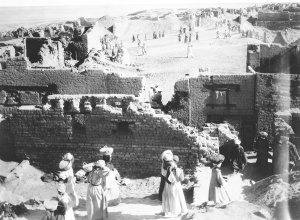Presented By: Kelsey Museum of Archaeology
FAST Lecture | Archive Archaeology at Karanis: Recontextualizing the Michigan Documentation
Tyler Johnson, Postdoctoral Fellow

Although far from modern standards, the University of Michigan excavations at Karanis (1924–1935) employed advanced recording techniques for their time. Documenting the site’s evolution through a system of “levels,” the excavators left behind a dense archival record of photographs, tables, notes, drawings, plans, artifact inventories, and survey results. Housed at the Kelsey Museum of Archaeology, this documentation has been consulted for a century but never systematically analyzed or disseminated. The most authoritative source remains an unfinished manuscript by Enoch Peterson (a professor at Michigan from 1924 to 1962), never published or made publicly available.
Today, a revival of interest in Karanis has created a demand for better curation and accessibility of these records. In response, researchers at the Kelsey Museum are leading a digital initiative with two objectives. First, drawing upon legacy survey data and new radiocarbon results, we are using the game engine Unity to reconstruct and reinterpret the site’s chronological evolution in three dimensions. Second, we are transforming Peterson’s manuscript and related materials into an interactive, open-access resource. These collaborative efforts between Kelsey researchers, staff, graduate, and undergraduate students go beyond digitization, requiring the restructuring and reassessment of excavation data within an updated framework.
As we integrate new insights and methodologies, our work sometimes calls the Michigan excavators’ original interpretations into question. This raises the need to balance faithful preservation of archival materials with that of reassessing the excavation results through contemporary archaeological lenses. This lecture explores the challenges and possibilities of conducting “archive archaeology” at Karanis, creating new tools for exploring, cross-referencing, and reinterpreting this essential legacy dataset.
Tyler Johnson is a postdoctoral fellow with the Kelsey Museum of Archaeology. He completed his PhD at the University of Michigan in 2023, focusing on the transformation of domestic buildings during Late Antiquity in the region around Rome. He has conducted fieldwork at Gabii, Italy, since 2013, where he now serves as director of topography and digital data. Tyler has also participated in a range of excavations and digital humanities projects in Italy, Albania, and the United States. His specializations include 3D modeling, database curation, and the use of game engines and graphical interfaces in archaeological and cultural heritage research. At the Kelsey, Tyler is a member of the AGROS project, an international collaboration investigating ancient diet through the analysis of organic materials from Karanis, Egypt, where the University of Michigan carried out excavations in the 1920s and 1930s. His work focuses on the archaeological contextualization of organic samples selected for chemical analysis, integrating the complex records of this legacy dataset with new methods in 3D modeling and data visualization.
FAST (Field Archaeology Series on Thursday) Lectures are free and open to the public. This event will take place in Room 125 of the Kelsey Museum’s Newberry Hall. Light refreshments and food will be provided at 5:30 PM, with the lecture starting at 6:00 PM.
If you have any questions or concerns regarding accessing this event, please visit our accessibility page at https://myumi.ch/zwPkd or contact the education office by calling (734) 647-4167. We ask for advance notice as some accommodations may require more time for the university to arrange.
Today, a revival of interest in Karanis has created a demand for better curation and accessibility of these records. In response, researchers at the Kelsey Museum are leading a digital initiative with two objectives. First, drawing upon legacy survey data and new radiocarbon results, we are using the game engine Unity to reconstruct and reinterpret the site’s chronological evolution in three dimensions. Second, we are transforming Peterson’s manuscript and related materials into an interactive, open-access resource. These collaborative efforts between Kelsey researchers, staff, graduate, and undergraduate students go beyond digitization, requiring the restructuring and reassessment of excavation data within an updated framework.
As we integrate new insights and methodologies, our work sometimes calls the Michigan excavators’ original interpretations into question. This raises the need to balance faithful preservation of archival materials with that of reassessing the excavation results through contemporary archaeological lenses. This lecture explores the challenges and possibilities of conducting “archive archaeology” at Karanis, creating new tools for exploring, cross-referencing, and reinterpreting this essential legacy dataset.
Tyler Johnson is a postdoctoral fellow with the Kelsey Museum of Archaeology. He completed his PhD at the University of Michigan in 2023, focusing on the transformation of domestic buildings during Late Antiquity in the region around Rome. He has conducted fieldwork at Gabii, Italy, since 2013, where he now serves as director of topography and digital data. Tyler has also participated in a range of excavations and digital humanities projects in Italy, Albania, and the United States. His specializations include 3D modeling, database curation, and the use of game engines and graphical interfaces in archaeological and cultural heritage research. At the Kelsey, Tyler is a member of the AGROS project, an international collaboration investigating ancient diet through the analysis of organic materials from Karanis, Egypt, where the University of Michigan carried out excavations in the 1920s and 1930s. His work focuses on the archaeological contextualization of organic samples selected for chemical analysis, integrating the complex records of this legacy dataset with new methods in 3D modeling and data visualization.
FAST (Field Archaeology Series on Thursday) Lectures are free and open to the public. This event will take place in Room 125 of the Kelsey Museum’s Newberry Hall. Light refreshments and food will be provided at 5:30 PM, with the lecture starting at 6:00 PM.
If you have any questions or concerns regarding accessing this event, please visit our accessibility page at https://myumi.ch/zwPkd or contact the education office by calling (734) 647-4167. We ask for advance notice as some accommodations may require more time for the university to arrange.